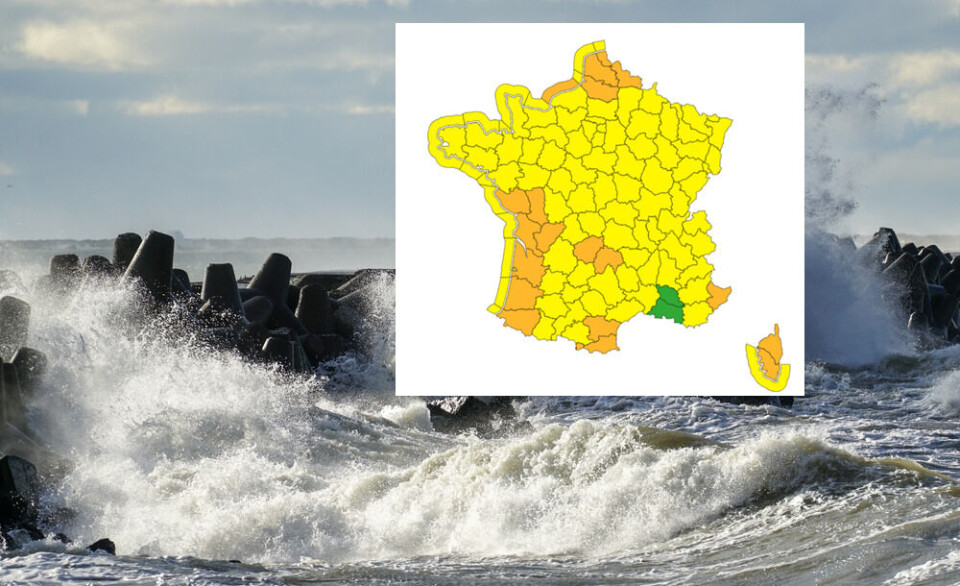-
Air France expands US schedule with direct Paris-Las Vegas route
Airline now offers 19 US destinations
-
2025 small business VAT reform definitively cancelled after Senate vote
New 2026 proposals remain on table but likely to be struck out as MP debates get underway
-
Small drop in percentage of French visa applications being declined
Roughly one in every six visa requests refused in 2024
What is France’s main courante police note and how could it help you?
The term has been in the news in relation to the controversy surrounding a French MP who has admitted slapping his wife

A leading left-wing politician - tipped by some commentators to be a future party leader - stepped down from his coordinator role in the party on Sunday after admitting to having slapped his wife.
It came after press reports revealed that the wife of Adrien Quatennens (from the far-left La France Insoumise party) had filed a ‘main courante’ to Lille’s judicial court last week over domestic violence without specifying its content.
It was reported that Céline Quatennens’ filed a main courante because she did not want to file an official complaint.
The Connexion looks into this legislative tool and how it could prove useful to readers.
What is a ‘main courante’?
A main courante is a statement from someone who wishes to report an incident of which they were a victim or witness without initiating a full criminal investigation. It can be filed in a local gendarmerie or commissariat.
People can also file a main courante if they are not sure whether the facts reported are against the law or not. It is meant to notify police forces of an event with no legal requirements.
However, the filing of one or multiple mains courantes can encourage a judge to open an investigation and file a complaint, such as was the case in Ms Quatennens’ situation.
Examples of situations in which a main courante may be made include neighbourhood noise issues, such as loud parties, noisy animals or machinery.
It can also be used for cases including the sudden departure of a spouse or pacsé partner from the shared home or child custody breaches.
A main courante is also often helpful in the case of harassment, insults and threats.
Filing a main courante can be useful in the case of a future court case, as it serves as an element of proof.
The facts reported in the statement may have taken place years before the filing but must fall within the limitation period in the event of a prosecution.
A copy of the main courante statement should always be issued by the police.
The person mentioned in the main courante will not be notified nor will he or she be summoned before police or a judge, unlike in the case of a complaint.
How is this different to an actual formal complaint?
Unlike ‘main courante’ the filing of a complaint leads automatically to the opening of an investigation and the person accused is notified by a judge. If the author of the infraction is not known, the victim can file a ‘plainte contre X.’
It is for this reason that the use of a main courante for sexual abuses, sexist remarks or domestic violence is prohibited, as these crimes must be addressed by filing an official complaint since the summer of 2021.
It is not known whether Ms Quatennens was aware of this rule or not, but the content of her main courante led to the opening of an investigation by Lille’s judicial court.
Jean-Luc Mélenchon praises Mr Quatennens’ ‘bravery’
Mr Quatennens admitted having slapped his wife during an argument via a press release published on his Twitter account.
He said that he “strongly condemned the politically vicious act of leaking the contents of the main courante to the press.”
Bonjour à tout·e·s, après les événements de cette semaine et dans un souci de transparence et d'apaisement, voici ma déclaration officielle. pic.twitter.com/ykwswNB4F5
— Adrien Quatennens (@AQuatennens) September 18, 2022
He added that to avoid speculation, he would admit that, after Ms Quatennens asked him for a divorce, “we have had arguments”.
“During one of them [...] I grabbed her wrist. During our last argument, probably the one which motivated her choice to file a main courante, I took her mobile phone. To get it back, she jumped on my back. I got away and as I freed myself, she hit her elbow.
“I think that Céline may also have described another event from about a year ago, when, in a situation of extreme tension and mutual aggression, I slapped her.
“I deeply regretted this action and apologised for it on many occasions.”
After Mr Quatennens stepped down from La France Insoumise, Jean-Luc Mélenchon, who led the party in the National Assembly until 2021, tweeted: “Political viciousness, media voyeurism and social media have encouraged me to enter into the antagonistic divorce of Adrien and Céline Quatennens.
“Adrien has decided to take it all upon himself. I salute his dignity and his bravery. I share with him my trust and affection.”
La malveillance policière, le voyeurisme médiatique, les réseaux sociaux se sont invités dans le divorce conflictuel d’Adrien et Céline Quatennens. Adrien décide de tout prendre sur lui. Je salue sa dignité et son courage. Je lui dis ma confiance et mon affection.
— Jean-Luc Mélenchon (@JLMelenchon) September 18, 2022
“Céline and Adrien are both friends of mine. My affection for him does not mean that I am indifferent to Céline. She did not want to be quoted. But I will say: a slap is always unacceptable. Adrien knows this.”
Céline et Adrien sont tous deux mes amis. Mon affection pour lui ne veut pas dire que je suis indifférent à Céline. Elle ne souhaitait pas être citée. Mais je le dis : une gifle est inacceptable dans tous les cas. Adrien l'assume. C'est bien.
— Jean-Luc Mélenchon (@JLMelenchon) September 18, 2022
Mr Mélenchon’s reaction was criticised as being “insufficient and unacceptable” by fellow LFI MP Pascale Martin, who described it as “a minimisation of the actions committed.
“These reactions are even more unbearable to us considering that we are part of a political movement which has placed the struggle against gender-based and sexual violence at the centre of its programme.”
Prime Minister Élisabeth Borne said that she found Mr Mélenchon’s tweet “extremely shocking”, adding that she saw in it “someone who trivialises intrafamilial violence”.
Rassemblement National’s Marine Le Pen said: “What shocked me the most about this affair is the reaction of Jean-Luc Mélenchon. Managing to create a tweet with so many laudatory comments about someone who was explaining that they had committed violent acts is really incredible.”
Related articles
Where can I find an English-speaking employment lawyer in France?
French mayor faces party expulsion over sex tape blackmail accusations
























